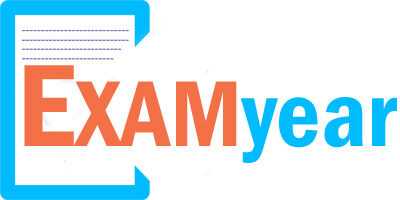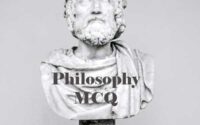Philosophy Practice Set
On this page, Applicants can check the below links for downloading the Philosophy Practice Set Papers. The Philosophy Practice Set Papers will be helpful for the applicants in their preparation. Hence, the people can begin the practice by downloading Philosophy Practice Set Papers.

The Philosophy Practice Set Papers may not contain the originally asked questions. Free downloading links of the Philosophy Practice Set Papers are enclosed below.
Practice Set on Philosophy
1. Recollection theory of knowledge is put forth by:
(A) Plato
(B) Aristotle
(C) St. Aquinas
(D) Thales
2. The term ‘doxa’ refers to ………. in Plato’s Philosophy.
(A) Doctrine
(B) Knowledge
(C) Opinion
(D) Theory
3. According to Plato, particulars are not:
(A) Copies of forms
(B) Shadows of forms
(C) Identical with forms
(D) Imitations of forms
4. According to Aristotle, universals are:
(A) Transcendent to particulars
(B) Immanent in the particulars
(C) Concepts in the mind
(D) Names in language
5. The “third man argument” criticizes the philosophy of:
(A) Sophists
(B) Atomists
(C) Plato
(D) Aristotle
6. Substance according to Aristotle is not:
(A) A grammatical subject
(B) A logical subject
(C) That which exists independently
(D) That which exists in the other world
7. Ontological argument is based on the concept of God as:
(A) a perfect being
(B) a necessary being
(C) the creator of the world
(D) the unmoved mover
8. The ontological argument offered by St. Anselm was criticized by:
(A) St. Aquinas
(B) Kant
(C) Descartes
(D) Spinoza
9. Which of the following arguments is not given by St. Aquinas to prove the existence of God?
(A) Ontological argument
(B) Argument from contingency
(C) Argument from graded excellence
(D) Argument from origin of motion
10. St. Augustine was mainly influenced by the philosophy of:
(A) Plato
(B) Aristotle
(C) Socrates
(D) Pythagoras
11. For Spinoza, another term for God is:
(A) Mind
(B) Body
(C) Nature
(D) Idea
12. According to Descartes, our knowledge of the external world is a/an:
(A) Perceptual knowledge
(B) Intuitive knowledge
(C) Deductive knowledge
(D) Innate knowledge
13. According to Leibnitz, ‘monad’ is:
(A) Non-physical substance
(B) Physical substance
(C) Existent
(D) Absolute idea
14. According to Locke, sound is a/an:
(A) Primary quality
(B) Secondary quality
(C) Accidental quality
(D) Composite of (A) and (B)
15. The author of ‘An Essay Concerning Human Understanding’ is:
(A) Hume
(B) Locke
(C) Kant
(D) Berkeley
16. The status of scepticism in Hume’s philosphy is a/an:
(A) Conclusion of inquiry
(B) Method of inquiry
(C) Basic proposition of inquiry
(D) Inference
17. In Kant’s philosophy, space and time are:
(A) Judgements
(B) Categories
(C) Forms of intuition
(D) Observable objects
18. Hegel maintains that contradictory aspects of things can be understood only as:
(A) Logical signs
(B) Part of an organic system
(C) Part of a formal logical system
(D) Mental formations
19. In Nietzsche’s philosophy, terms like ‘Apollonian and Dionysian’ refer to:
(A) Greek Gods
(B) Forces
(C) Myths
(D) Mental images
20. Heidegger’s term Dasein appropriately refers to:
(A) Fundamental being
(B) Being-in-itself
(C) Being-in-the-world
(D) Being-for-itself
More Question Papers on Philosophy
| Question Papers | Question Bank |
| MCQ Objective | Practice Set |
| Selected Question | Mock Test |
| Typical Question | Old Questions |
| Test Papers | Sample Papers |
| Important Question | Model Question |
21. Kant maintains that conditions of genuine knowledge consist of:
(A) Analytic judgements only
(B) Synthetic judgements only
(C) Synthetic a priori judgements
(D) Synthetic a posteriori
22. According to Nietzsche, Christian morality is an example of:
(A) Will to power
(B) Slave morality
(C) Master morality
(D) Rational morality
23. According to Moore, Berkeley’s idealism fails to distinguish between:
(A) Logical and Psycholgoical object
(B) Consciousness and the subject of consciousness
(C) Consciousness and the object of consciousness
(D) Perceived and imagined object
24. According to Ambedkar which of the following statements is not true?
(A) To maintain purity of life is Dhamma
(B) To reach perfection in life is Dhamma
(C) To live in nibbana is Dhamma
(D) To believe in God is Dhamma
25. Which of the following principles is not mentioned by Ramanuja in Tattvatraya?
(A) Spirit (Cit)
(B) Matter (Acit)
(C) Time (Kala)
(D) God (Isvara)
26. According to Sankaracarya the world is real only as ………..
(A) Paramarthika Satta
(B) Vyavaharika Satta
(C) Both (A) and (B)
(D) Neither (A) nor (B)
27. According to Jaina Darsana , Dravya (Substance) has ……………. and ………….
(A) Samanya, Visesa
(B) Guna, Paryaya
(C) Guna, Samanya
(D) Paryaya, Visesa
28. …………. Dravyas (substances) are advocated by Vaisesika.
(A) 6
(B) 3
(C) 9
(D) 10
29. If Karana is inseparably connected with the effect, then the Karana is called …………..
(A) Samavayi Karana (inherent cause)
(B) Asamavayi Karana (noninherent cause)
(C) Pratiyogi Karana (opposite cause)
(D) Nimitta Karana (efficient cause)
30. Hobbes is a/an …………
(A) Nominalist
(B) Conceptualist
(C) Idealist
(D) Rationalist
31. According to …………, Being is one and indivisible.
(A) Heraclitus
(B) Plato
(C) Aristotle
(D) Parmenides
32. ‘Degrees of truth’ are maintained by:
(A) Plato
(B) Aristotle
(C) Bradley
(D) Kant
33. Brain-mind identity theory is put forth by:
(A) Descartes
(B) Spinoza
(C) Ryle
(D) J.J.C. Smart
34. Who speaks of feigning the identity?
(A) Locke
(B) Berkeley
(C) Hume
(D) Kant
35. Which of the following is maintained by Abhihitanvayavada?
(i) Words have separate meaning.
(ii) The meanings of independent words get connected to express sentence-meaning
(iii) Words function to help convey the meaning of a sentence.
(iv) Meaning of a sentence is a function of the meanings of the component words.
Options:
(A) (i) and (ii)
(B) (i), (ii) and (iii)
(C) (i), (ii) and (iv)
(D) (i), (iii) and (iv)
36. According to Anyathakhyati:
(A) Object of error is unreal
(B) Object of error is imaginary
(C) Object of error is real
(D) Object of error is elsewhere and is real
37. Identify the true sentences:
(i) According to Buddhists, knowledge is intrinsically invalid.
(ii) According to Naiyayikas invalidity of knowledge is extrinsic.
(iii) According to Prabhakara, invalidity of knowledge is intrinsic.
Options:
(A) (i), (ii) and (iii)
(B) only (i)
(C) (i) and (ii)
(D) only (ii)
38. Which of the following theories of pramanya (Validity) accepted by Nyaya darsan?
(A) Svatah-Pramanya (Intrinsic validity)
(B) Svatah-Apramanya (Intrinsic invalidity)
(C) Paratah-Pramanya (Extrinsic validity)
(D) Svatah-Pramanya and Paratah-Apramanya (Intrinsic Validity and Extrinsic Validity)
39. Knowledge that has no source in experience can be termed as:
(A) A priori
(B) A posteriori
(C) Tentative
(D) Synthetic
40. The condition of knowledge that connotes objectivity is:
(A) Justification
(B) Truth
(C) Correspondence
(D) Verification
41. Edmund Gettier’s famous paper published in 1963 was entitled:
(A) Justified true belief is not knowledge
(B) Knowledge cannot be defined
(C) Is justified true belief knowledge?
(D) Why is justified true belief knowledge?
42. The semantic theory of truth was offered by:
(A) Ryle
(B) Moore
(C) Tarski
(D) Russell
43. The truth of the premises of an inductive argument do not:
(A) in a priori way lead to the truth of its conclusion
(B) prima facie lead to the truth of its conclusion
(C) in a posteriori way lead to the truth of its conclusion
(D) prospectively lead to the truth of its conclusion
44. Which of the following is true about the Buddhist theory of Anumana?
(1) Hetu is Trilaksanatmaka
(2) Vyapti is derived from tadatmya and tadutpatti
(3) Anupalabdhi anumana is a variety of anumana
(4) Asatpratipaksatva is one of the conditions of good hetu
Options:
(A) (1), (2) and (4)
(B) (2), (3) and (4)
(C) (1), (2) and (3)
(D) (1), (3) and (4)
45. Find out which of the following is not included in the Buddhist classification of anumana?
(1) Samanyatodrsta Anumana
(2) Svabhavanumana
(3) Anyathanupapanna anumana
(4) Anupalabdhi anumana
Options:
(A) (1) and (3)
(B) (1), (2) and (3)
(C) (2) and (4)
(D) (2), (3) and (4)
46. Nirvikalpaka and Savikalpaka are two stages of pratyaksa Jnana. This view is held by the:
(A) Naiyayikas
(B) Carvakas
(C) Buddhists
(D) Naiyayikas and Carvakas
47. Right faith, right knowledge and right conduct are known as …………..
(A) Triratna
(B) Triguna
(C) Tripitak
(D) None of the above
48. Which among the following are not the kinds of Pratyaksa according to Nyaya?
(A) Samanyalaksna and Jnanalaksana
(B) Laukika and Alaukika
(C) Nirvikalpa and Savikalpa
(D) Vahaya and Antara
49. Sadharanadharmas are to be practised by ……………..
(A) All human beings
(B) Hindus
(C) Indians
(D) All beings
50. The theory of varna is derived from:
(A) Nasad iya-sukta
(B) Purusa-sukta
(C) Bhagavad-gita
(D) Brahma-sutras

